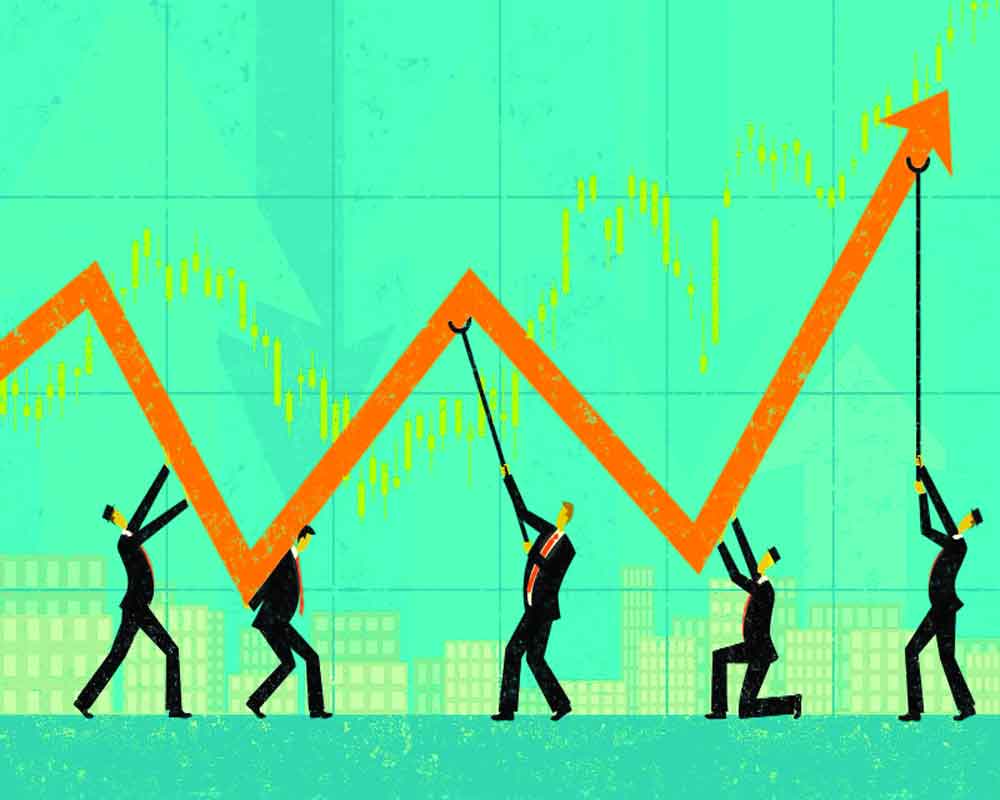Professors Anuradha and Dhruv Jain put forth a roadmap for growth and development
The unprecedented Coronavirus pandemic has resulted in great pain and distress. It has adversely affected lives and livelihood. While undoubtedly lives are more important than livelihood, the latter, which is linked to the overall economy, also needs the government's urgent attention. Loss of livelihood today can lead to loss of lives tomorrow.
As the first wave of Covid started subsiding, the economy slowly moved towards recovery. However, now with the onslaught of the second wave, all efforts undertaken to revive the economy got derailed.
It was expected that the ease of supply that came with the lifting of lockdown would lead to a V-shaped recovery, but that did not seem to happen. The policy initiatives undertaken by the government were all supply-side and focussed on improving liquidity and strengthening capacity. Despite the lifting of the lockdown, the industries were functioning at below total capacity, and that is because the real devil in the game is low aggregate demand.
Aggregate demand has four components: Private consumption, private investment, government expenditure, and net exports(C+I+G+X-M. Consumption, investment and net exports have slumped. Government expenditure has seen an upward trend but this alone cannot drive the growth.
The economy was experiencing low demand even before the pandemic; probable reasons were Demonetisation and GST implementation. However, this pandemic has aggravated it.
Now is the time to address the problem of inadequate demand, without which a strong recovery is not possible.
Reasons
First, due to strict lockdown, demand for non-essential items has fallen by at least 50 percent. Also, precautionary savings have increased due to uncertainties in the economy and growing health issues. Second, consumer sentiment is weak, which is evident by a fall in ‘consumer confidence’ as per the survey conducted by RBI. Looking at the uncertainties in the economies, consumers lacked confidence in the system. Third, rise in unemployment and a fall in income as 43.8 million people were involuntary unemployed in India in March 2021, said Vyas of CMIE. The unemployment rate was 8.2 percent in the first week of April compared to 6.7 percent during the end of March, as per data provided by CMIE.
Impact
According to Keynesian economics, when demand for goods and services falls, the investors decrease their investment, leading to decreased production. Investors reduce the wage rates, and people are laid off to cut costs due to lower production and sales. The increase in unemployment leads to a cutting down of consumption, and the economy finds itself in a vicious cycle, which harms the economy's growth. For the revival of the economy now, the only way out is to break this vicious circle by stimulating demand. The increase in demand will make the business profitable and motivate investors to invest. A similar situation was experienced during the great depression of 1929-30 and the world economy could recover by increasing the demand. After this experience, people realised the importance of the demand side of the economy.
Road Ahead
Even before the pandemic, the economy was already slowing down, with deficiencies evident in consumption and investment demand. These two components are the foremost crucial part of aggregate demand and growth drivers. Lack of demand, both consumer demand and investment hit all segments no matter their economic nature. The only way to revive and boost the economy is by stimulating demand. It can then feed into the longer-term investment cycle through the multiplier effect.
According to National Accounts Statistics, approximately 55 per cent of the working class are employed with informal sectors and are badly affected by the pandemic. Several Direct Benefit Transfers (DBT) covering more people are required to spice up the demand. Earlier, economists like Abhijit Banerjee and Rathin Roy made strong arguments favoring such transfer by saying that providing income support and preventing wealth disruptions are necessary to cater to this extraordinary situation. The pandemic has hit the poor and a sizeable section of the workers who don't have any Social Security. While it's true that identifying the affected population may be a difficult task, it'll not be impossible, either, using Aadhaar and a coordinated effort between central and state governments. Temporary income support for six months through DBT can further augment consumption and aggregate demand.
Second, to stimulate the consumption demand, the government should provide employment guarantees to migrant labourers. The Marginal Propensity of Consumption (MPC) of the lower-income group is high and therefore, it will boost the market and help the revival of the economy. The multiplier is directly related to MPC. Higher the MPC higher will be the multiplier effect.
Third, the government should attempt to tap the debt market by issuing COVID bonds at floating rates, assuming that rates will be lower for some time. Because many significant funds, institutional and high net worth individuals, may opt for an assured return (guaranteed by the government of India) COVID bond even at a relatively lower rate of interest. Part of the fiscal deficit can be monetised by borrowing from the RBI at a fixed rate lower than the repo rate and a longer duration (at least 10-year).
(The authors are Professors of Economics, VIPS & Dhruv Jain-Management student, DU)


























